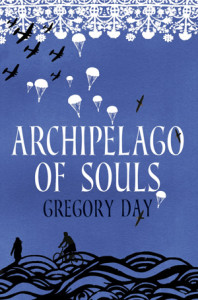 ARCHIPELAGO OF SOULS
ARCHIPELAGO OF SOULS
Gregory Day
Picador, June 2015, RRP $32.99
Archipelago of Souls appealed to me at first glance. Its main character, Wesley Cress, arrives as a soldier settler on King Island and provides an instant link to my own family history. My father and his brothers and sisters grew up for the most part on King Island after my grandfather took land there as a soldier settler himself. Though the book is set probably 15 years or so before my family arrived there, I couldn’t help wondering if the (in)famous Kelly Quirk might make an appearance somehow. That’s the power of half-remembered family legend, I suppose.
When I was 18 or so, we took a family trip to King Island to look at the old farm, which had been sold on to another family some decades again. We went in June or July, for peak wind effect, and spent a few days in family reunion. I never met my grandfather. I’ve heard some of his ludicrous stories, tales about his … let’s call them “adventures” on the island and his youth, of his alcoholism and his time during the war. My dad and my grandma, Na, also died when I was five and 14 respectively; and on the island I felt very connected with them despite their absense. So the cold trip on the isolated island remains a powerful memory. King Island is part of the family mythology.
Of course, Archipelago of Souls is fiction, and there was no logical reason for traces of my family to pop up in it, given the time period. Nonetheless, the vague disappointment of vague hope might have coloured my perception of the book. Gregory Day evokes the harsh weather and artificial distances created by insular living well, but I feel like the character of the island is lacking in this novel. It feels like a setting chosen for its turbulence and because of its comparability with the much larger and more populous island of Crete, where Cress spends his war. Or perhaps it just that Day uses King Island like a backdrop; it is not our King Island.
What I can say without a doubt is that I found Archipelago of Souls rather overwritten. There are moments and passages that are beautiful, but Day seems to feel pressured to drive home his intended message, to draw comparisons with forced poetry that detract from the characters he is creating and from some potential poignancy in his story-telling. It’s a shame, but a shame that seems particularly common in–although certainly not limited to–Australian literary fiction. I found much of Cress’ inner monologue cloying to the point where I was rolling my eyes as I read, and I did need to force myself to read to the very end.
The story is compelling, but as is often the case of literary fiction written by men, assumes men are the world. I guess it’s time to admit I’m just bored with stories by and about men. At least for the time being. I do have an interest in the Second World War; I don’t mind love stories, though I’d prefer more diverse love stories in Australian mainstream fiction. I was frustrated by Cress’ inability to understand Leonie Fermoy’s inner world, to the extent that he could genuinely connect with her only through her male relatives. And I was frankly annoyed by the staid story of a broken soldier finding a broken bird to love. The notion of mutual healing through love is not lost on me, just overused. And yes, I’m tired of everyone’s mother being dead.
Archipelago of Souls is well-crafted. Its narrative and themes tie together well with the setting and in the characters. As I noted above, there are many brilliant and emotive moments. The spiritual elements are comparitively subtly spread through the piece, at least until Cress (spoiler alert) shoots a bloody priest. We get a genuine sense of Cress’ loneliness, even as he tries to convince himself of his own self-sufficiency, and this is interesting. There is a lot of potential in this book, but it is sadly stymied by the overddriven metaphors and self-conscious prose.

